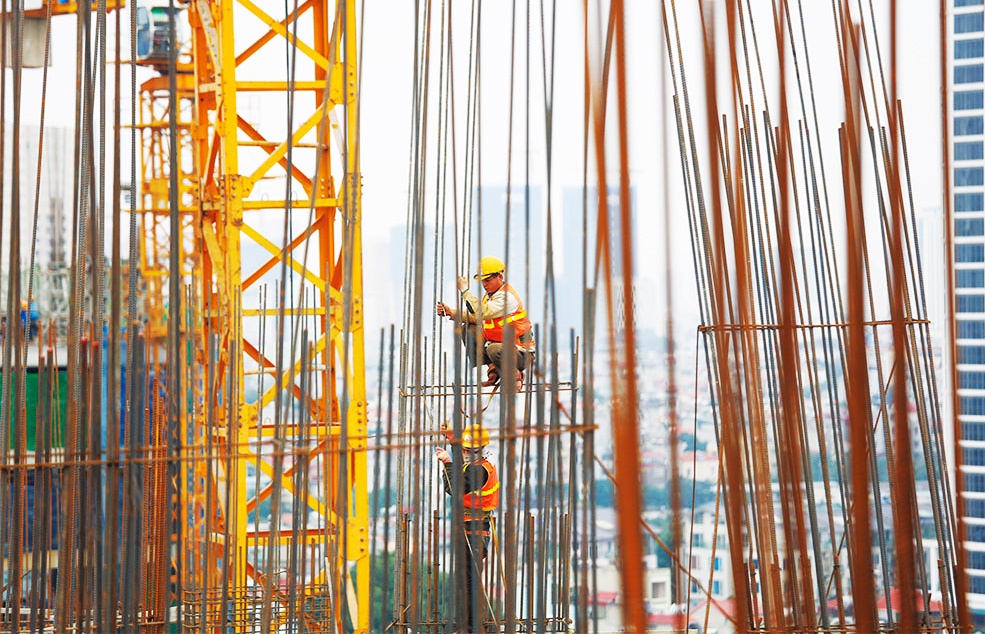How real estate developers can benefit from ESG considerations
The real estate sector has its own unique characteristics, which means that the environmental, social, and governance (ESG) criteria for this industry will be specific to it.
 |
| Mai Nguyen - Representative, International Division, American Planning Association |
By understanding the fundamental value of ESG, real estate developers can create strategies that align closely with their corporate business strategies. This will enable them to effectively integrate ESG into their operations and achieve the best possible outcomes.
This trend is gradually becoming a competitive advantage to attract new capital. For example, Singapore has recently usurped Hong Kong in the Asia-Pacific region in attracting green capital flows.
Singapore has a reputation for sustainable development, and it is clear that they are doing well to strengthen their competitive advantage in the race against Hong Kong in the Asian market.
Good practice of ESG offers several advantages, such as the attraction of green bonds, green loans, and green investment funds with favourable interest rates. Additionally, companies with high ESG standards are often given priority for investment from sources with high related requirements, including those in Europe, the United Kingdom, Japan, and the United States, as well as financial institutions like the World Bank.
According to Bloomberg Intelligence statistics, by 2025, total ESG assets could reach $53 trillion, and Asia is an exciting market for related investment. Therefore, Vietnam should consider this a great opportunity to achieve its goals of taking advantage of foreign capital to pursue the country’s sustainable development goals.
Vietnam is undergoing rapid urbanisation, and along with the shift of production out of China and the growth of its tourism industry, its real estate market is expanding in all segments.
The real estate industry ranks second in attracting foreign investment, at approximately $4 billion. Vietnam’s commitment to reach net-zero carbon emissions by mid-century, and its sustainable economic development strategy, greatly contributes to its attractiveness as a business partner.
Danish toymaker Lego Group, for example, recently announced plans to invest around $1 billion in a carbon-neutral factory in Vietnam, citing the country’s commitment to sustainability as a key factor in their decision. Additionally, Lego requires high ESG standards from its partners in Vietnam.
Vietnam has a lot of potential and is a new and attractive destination for foreign investors, but in order to improve its competitiveness with other markets, it needs timely and appropriate responses. By promoting and committing to sustainable development goals and robust practices, domestic companies and developers will have more opportunities to access capital sources and green bonds from abroad.
A study by CBRE in the US showed that LEED-certified green buildings have higher rental prices than conventional buildings, from 5 to as much as 50 per cent, depending on the city and location. They also have faster occupancy rates. In Vietnam, first-generation green buildings have recorded rental rates at 10-20 per cent higher. These figures indicate that green building is a financially viable investment trend that improves ESG practices.
 |
| How real estate developers can benefit from ESG considerations, Photo: Dung Minh |
Real estate investors also benefit from sustainable building incentive programmes, such as concessional loans from banks, or green building promotion programmes in Vietnam. Investing in certified green buildings such as LEED, EDGE, and LOTUS is a significant first step for businesses and investors who want to reaffirm their ESG commitments while achieving financial performance.
But the criteria cover much more than just green buildings. In a broader sense, ESG also helps to address urban development issues.
In addition to typical ESG metrics that address basic human-related matters such as human rights, labour standards, diversity and inclusion, and data privacy, the social aspect of ESG in real estate can also be expressed through businesses and investors making contributions to the wider community, investing in affordable housing, and building civic facilities such as parks and art centres for the community.
Meanwhile, the governance factor is equally important as the environmental and social factors of ESG. By implementing a good governance structure and approach with a long-term vision, and an ESG-focused business strategy, a company can become a reliable partner according to investors and establish its reputation.
Some foreign investors are often hesitant to invest in businesses in Vietnam due to concerns over transparency. However, if a real estate company has ESG commitments and discloses information transparently, it can build trust with these investors.
The governance factor is also related to the cooperation between real estate enterprises and local authorities. In addition to pursuing their own projects, real estate developers can also work with local authorities to make social contributions, such as improving infrastructure, building roads, bridges, culverts, and creating public open spaces.
Adopting such practices can bring many benefits, both financial and non-financial. Developing an ESG strategy and implementing it does not have to be difficult. Some businesses may think that it will require a lot of upfront investment and that the criteria are a far-off goal, but this is not always the case.
Implementing ESG can actually save money eventually and improve a company’s reputation and standing in the community. In fact, many companies have already been implementing some criteria without systematically recording them.
For example, building designs may meet green standards without pursuing certifications, which can disadvantage them in accessing green bonds. Real estate businesses should therefore establish a specific ESG strategy to review their current practices and make plans for the future.
By integrating ESG into operations, real estate businesses can seize new opportunities, improve profitability, manage risks, and gain a competitive edge in attracting foreign capital for the sustainable development of Vietnam.
| Businesses can show the way with ESG compliance Why integrate ESG plans into business? Dealmaking potential ripe in Vietnam for ESG-minded groups |
What the stars mean:
★ Poor ★ ★ Promising ★★★ Good ★★★★ Very good ★★★★★ Exceptional
Related Contents
Latest News
More News
- Masan Consumer names new deputy CEO to drive foods and beverages growth (February 23, 2026 | 20:52)
- Myriad risks ahead, but ones Vietnam can confront (February 20, 2026 | 15:02)
- Vietnam making the leap into AI and semiconductors (February 20, 2026 | 09:37)
- Funding must be activated for semiconductor success (February 20, 2026 | 09:20)
- Resilience as new benchmark for smarter infrastructure (February 19, 2026 | 20:35)
- A golden time to shine within ASEAN (February 19, 2026 | 20:22)
- Vietnam’s pivotal year for advancing sustainability (February 19, 2026 | 08:44)
- Strengthening the core role of industry and trade (February 19, 2026 | 08:35)
- Future orientations for healthcare improvements (February 19, 2026 | 08:29)
- Infrastructure orientations suitable for a new chapter (February 19, 2026 | 08:15)

 Tag:
Tag:



















 Mobile Version
Mobile Version